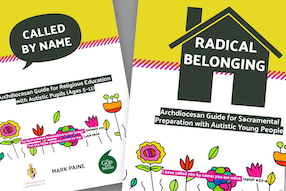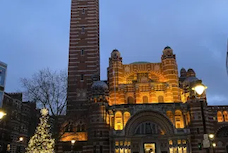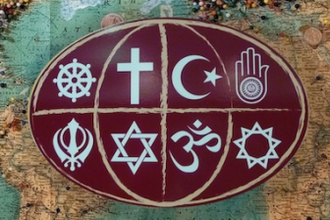Text: Archbishop Bernard Longley at Installation in St Chad's Cathedral

Archbishop Bernard Longley
Archbishop Bernard Longley gave the following homily at his Installation Mass today, the Feast of the Immaculate Conception. in St Chad's Cathedral, Birmingham.
Today is one of the two Patronal Feasts of this Archdiocese. Together with the Feast of St Chad in March, the Immaculate Conception of the Blessed Virgin Mary is year by year a day when the Catholic Church across these Midland Counties and their Cities recalls and celebrates its identity in faith and its mission in Christ. In preparing for this day I have been very conscious that I am entering into the life of a Christian family that has a long and rich history as well as its distinctive vocation to make Jesus Christ present, known and loved in this, the heart of England.
This Mass of Installation is a profoundly personal experience for me - but it is much more than that. It is an ecclesial moment in which each one of us, in our own particular way, is caught up by God's grace at work in the life of this Archdiocese. It is a moment in the life of the Church when we renew our awareness of Christ's presence through his people, the body of his faithful.
Our Patronal Feast of the Immaculate Conception makes us aware of the power of Christ at work within us, as individuals and as communities, even - and perhaps with most effect, most fruitfully - when we are least aware of it. As Catholics we believe that our Lady was herself held free from sin and from the influence of original sin, from the first moment of her life, through the saving merits of her own Son, Jesus Christ. Her closeness to God is the first fruit of redemption and it eventually enabled her to recognise and welcome the hand of God directing the course of her life. Yet the most important moment of grace in Mary's life occurred when she was as yet incapable of sensing or recognising it, still less understanding its importance.
It is often the same with us. Most of us were baptised as babies: the pattern of and potential for our lives of faith was established when we could never have understood or appreciated it. Only later in life we become grateful for what our parents and god-parents did for us and actively live the life of faith we received through their commitment to Christ and to us. Moments of grace often catch us unawares and it is only when we stop and reflect that we can appreciate their significance in the pattern of our lives.
Mary was prayerful and reflected on life's experiences: she pondered these things in her heart. No doubt, as the life of her Son unfolded before her, she looked back and understood the meaning of what she had seen and heard and felt. St Luke does not disguise the fact that our Lady, even though she was full of grace, was deeply disturbed by the angel's words. The natural, human reaction of bewilderment and astonishment at something so powerful caused her to face it and accept it. Mary had two moments of amazement: first that she was chosen: Rejoice, so highly favoured one. And then, that her life was to be fruitful with the birth of Christ, that she was chosen to be a mother.
Mary's experience awakens in us the recognition of an extraordinary grace: we too, each of us, have been chosen and are highly favoured. In the words of St Paul's Letter to the Ephesians: In him we were claimed as God's own, chosen from the beginning. We shall never fully understand the reason for God's choosing until we come one day to see him face to face, yet we have been chosen, each in our own particular way and together as the Church, to bear Christ to others.
The Feast of the Immaculate Conception reminds us, through Mary's example, of the Church's calling to be holy and to bear Christ to the world, and of the wonderment that overcomes us when we ponder on God's choosing and calling and empowering.
These thoughts have given me a profound sense of hope about the future and deep-rooted gratitude for the life and witness of the Archdiocese of Birmingham, its bishops, priests and deacons, its Religious men and women and all the lay-faithful. I am conscious above all of the dedication and devoted service of those whom I now join and of those who have gone before me. Symbolic moments in the Installation Ceremony prompt me to express particular thanks.
In their welcome on the threshold of the Cathedral and at the cathedra I thank the Auxiliary Bishops, the Chapter of Canons and all the Clergy of the Archdiocese for the life of faith that they sustain and the work of evangelisation that they enable and promote year by year. In receiving the Book of the Gospels I thank Bishop William Kenney for his steadfast service as Diocesan Administrator over the last six months in generous response to the confidence that was readily placed in him.
I am grateful, and it was so fitting, that Archbishop Vincent should hand on to me the Pastoral Staff of Bishop Ullathorne. Over the last six months I have been blessed to work with Archbishop Vincent as one of his Auxiliary Bishops in Westminster. It has enabled me to glimpse something of his deep affection for this Archdiocese, its priests and people, and to see how he has guided and invigorated its mission since he arrived here in 2000.
[And if he could interject now, I feel sure that he would say: "Now, Bernard, you should be emphasising all that I have received and how the Archdiocese has helped shape and enrich my life and ministry." I pray that the same may be true for me in the many years that lie ahead.]
In today's first reading from the Book of Genesis one phrase in the conversation between God and Adam is prominent for me: The Lord God called to him: "Where are you?" At times of change, when there is loss or gain in our lives, we are inclined to say to ourselves: "Where am I - Where are we?" [I have asked that question once or twice of myself over recent days!] But whenever we ask the question of ourselves it is a matter of chance whether we hear a reply that really helps us. When it is God's voice that we hear calling us: "Where are you?" we can truly find our bearings in relation to him. He becomes our trusted point of reference, the compass-point that enables us to find the right direction for our lives.
Because of her Immaculate Conception Mary's ear was tuned-in to the voice of God throughout her life. In her encounter with Gabriel, God showed our Lady where she stood and her response was prayerful obedience: Let it be done to me according to your word. And according to the tradition enshrined in the Magnificat she and the Church were to become aware of the central place that her obedience had given her in the whole history of salvation: All generations will call me blessed.
Others, Saints and Christian witnesses, have experienced this same questioning by God. Blessed Dominic Barberi was so driven by God's call that he saw from an early age that he must leave his native Viterbo and come to England to preach the Gospel where Catholic faith was beginning to flourish again. We know how hard he worked in Stone in Staffordshire and how his dedicated life as a priest so touched and influenced Cardinal John Henry Newman and helped Newman to find the future direction of his own life and work.
In the remarkable year ahead when we prepare for his Beatification, we will be influenced by the way that Cardinal Newman responded both within the Church of England and in the Catholic Church to the call from God: "Where are you?" His Apologia Pro Vita Sua makes plain his diligent and unselfish search for truth in his own life and for the world, and his hymn Lead Kindly Light sums up his complete confidence in the guiding hand of God. During this Year for Priests Cardinal Newman and Blessed Dominic offer us two wonderful, complementary examples of how to be faithful to the path of life mapped out for us in God's providence when we were ordained.
"Where are you?" is still a question about identity and purpose that God asks of us today. It is asked of the people of Birmingham and of the other six cities within the Archdiocese. In forming local communities that have confidence in finding creative and fruitful answers to that question I am grateful that our Catholic Archdiocese works alongside Christians from all the other Churches in a spirit of ecumenical co-operation and commitment. It is good to know that we shall experience and express our communion together in prayer, witness and outreach, and I am grateful that so many of the other Church Leaders are
here with us today.
As Christians we also believe that we must ponder that fundamental question from God alongside our brothers and sisters in the other major religious communities, for it is together that we must engage with all our fellow citizens in searching for goodness and truth in our values and behaviour. I wish to build upon Archbishop Vincent's commitment to inter-religious friendship and co-operation and to be part of our common witness in the service of others.
I only arrived in my new home last Wednesday and on the next day I saw posters and banners advertising the Nativity Trail at the City's Museum and Art Gallery. I felt so encouraged to see this prominent institution, with the support of the City Council, enabling the story atmthe heart of Christian faith to be experienced and appreciated through the beauty and the message of great works of art in public ownership. I am grateful that our Civic Leaders have been able to join us today.
Now as I look to my future life with you I recall with gratitude those who have shared with me their own faith and who have shaped my life and ministry over many years. In particular I thank our Lord for sharing his Priesthood with me through my ordinations as priest and bishop by Cardinal Cormac, and for guiding my life through his wisdom and insights.
I also recall the early experience of Bishop William Ullathorne, mentioned recently by Archbishop Vincent at a Mass of Thanksgiving to mark my departure from Westminster. As a teenager he experienced something that changed the whole course of his life when far from home in the Baltic port of Memel, modern-day Klaipeda. Through the faith and devotion of the local people at Mass he felt God's power claiming his own life. As I visit the parishes and school of our Archdiocese in the years ahead I pray that I too may continue to be moved by the faith and witness of our priests and people and always open, after the example of our Lady, to the claim of God upon my life. Please continue to pray for me.


















